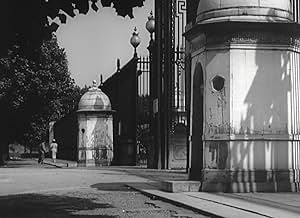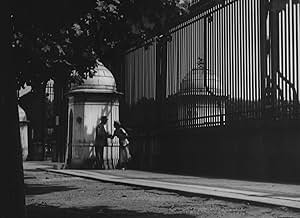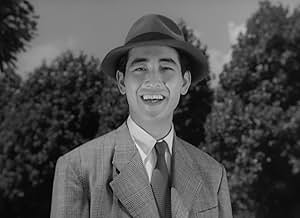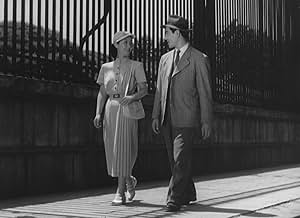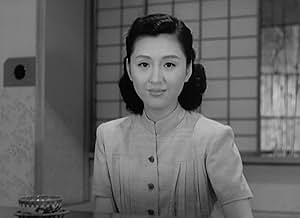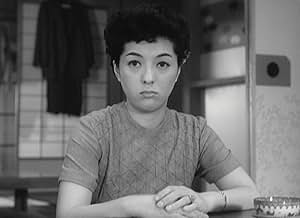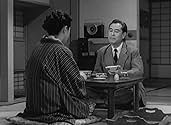IMDb RATING
7.6/10
4.1K
YOUR RATING
A childless middle-aged couple faces a marital crisis.A childless middle-aged couple faces a marital crisis.A childless middle-aged couple faces a marital crisis.
- Awards
- 1 win total
- Director
- Writers
- All cast & crew
- Production, box office & more at IMDbPro
Featured reviews
Michiyo Kogure is discontented with her long marriage to Shin Shiburi. She refers to him as "Mr. Obtuse" to her female relations and friends, and talks them into going on holiday with her, claiming to him that her niece, Keiko Tsushima, is at the resort, suffering from appendicitis; she's probably scared and lonely; and then Miss Tsushima walks in. Miss Tsushima is also a problem. Like many an Ozu woman, she doesn't want to get married yet, and certainly doesn't want an arranged marriage like her aunt. It's so primitive.
It all comes to a head one evening when he's enjoying rice with green tea and his wife doesn't like that way of eating it. He tries to explain that he likes simple, primitive, informal things, like cheap cigarettes and third-class railway tickets and pachinko machines. He understands she likes the 'better' things, and that's fine. And he won't pour tea on his rice any more. Her response is to walk out of the room.
I decided most of the way through that this was Ozu's variation on THE TAMING OF THE SHREW, without any of Petruchio's cruelty.... at least on the part of Mr. Shiburi. The studied cruelty is exhibited, in truth by Miss Kogure. There's not a cruel bone in Shiburi's body. He tries to get his niece to do the right thing simply by talking. He's remembered fondly by a member of his old army squadron as kind; he's sponsoring Kôji Tsuruta for a job at his company because he's the brother of an old high-school friend who got killed in the war. Perhaps Kate is a combination of Miss Kogure and Miss Tsushima.
The transformation of Ozu's style from before the war is almost complete. Gone are the American movie posters, although there's some discussion of a Jean Marais film; and the camera sticks pretty close to the floor, although there is one pull-in at the end of a scene, after the players have left. I'm not sure what that is supposed to mean.
It all comes to a head one evening when he's enjoying rice with green tea and his wife doesn't like that way of eating it. He tries to explain that he likes simple, primitive, informal things, like cheap cigarettes and third-class railway tickets and pachinko machines. He understands she likes the 'better' things, and that's fine. And he won't pour tea on his rice any more. Her response is to walk out of the room.
I decided most of the way through that this was Ozu's variation on THE TAMING OF THE SHREW, without any of Petruchio's cruelty.... at least on the part of Mr. Shiburi. The studied cruelty is exhibited, in truth by Miss Kogure. There's not a cruel bone in Shiburi's body. He tries to get his niece to do the right thing simply by talking. He's remembered fondly by a member of his old army squadron as kind; he's sponsoring Kôji Tsuruta for a job at his company because he's the brother of an old high-school friend who got killed in the war. Perhaps Kate is a combination of Miss Kogure and Miss Tsushima.
The transformation of Ozu's style from before the war is almost complete. Gone are the American movie posters, although there's some discussion of a Jean Marais film; and the camera sticks pretty close to the floor, although there is one pull-in at the end of a scene, after the players have left. I'm not sure what that is supposed to mean.
Another sensitive Ozu film about family. In this one, a somewhat upper-class woman resents her more simple, middle-class husband (by arranged marriage), while also encouraging her niece to go to arranged marriage meetings. As always with Ozu, I found an awful lot to like about this movie, but I wasn't quite enamored enough to gush over it. Most of the core cast is superb, although it's not Ozu's usual team (Setsuko Hara is nowhere to be seen, although Chishu Ryu and Chikage Awashima have minor roles). Michiyo Kogure might be a little too nasty, but I have to say it's kind of refreshing to see a less restrained character in an Ozu film. Perhaps the film wraps up too nicely and neatly, going too obviously for a touching moment, but I wouldn't say it's entirely unwarranted. At any rate, I enjoyed the film with its insights and gentle humor.
Ozu marriage stories are one of the best ones. He really hits you with his deep and truthful dialogues. I loved the cinematography and the use of shadows. Also, I got hungry watching this.
Japanese master Yasujiro Ozu made this 1952 film between two masterpieces, Early Summer and (especially) Tokyo Story, and this film suffers a bit by comparison with them. As in other (somewhat more accomplished) movies by Ozu (one thinks especially of the superb Late Spring) the plot deals on the issue of whether a young woman should marry, and if that marriage should be a love marriage or arranged one. There is a middle aged, childless couple, the snobbish, nasty Taeko (Michiyo Kogure) and her husband, the honest, good but a bit dull salary man Satake (Shin Saburi). Her nephew, the pretty young Setsuko (Keiko Tsushima) comes to visit, she has to go to an interview for an arranged marriage, but seeing the loveless marriage between Taeko and Satake, and how she mocks him behind his back, is not very interested.
Ozu's best films haven't dated a bit, but this one has somewhat. Moreover, while I don't agree with the generalization that all of Ozu's films are slow (not all of them are), this one is on the leisurely paced side. What's more, the movie takes some time to develop its plot so it does require a bit of patience from the viewer. You will eventually warm up to this movie, I think, but not immediately.
On the plus side, it is a good, interesting movie, with believable, well developed characters. Chishu Ryu, Chikage Awashima and Kumiko Mikaye (all regular of many Ozu films) have bit roles here.
Ozu's best films haven't dated a bit, but this one has somewhat. Moreover, while I don't agree with the generalization that all of Ozu's films are slow (not all of them are), this one is on the leisurely paced side. What's more, the movie takes some time to develop its plot so it does require a bit of patience from the viewer. You will eventually warm up to this movie, I think, but not immediately.
On the plus side, it is a good, interesting movie, with believable, well developed characters. Chishu Ryu, Chikage Awashima and Kumiko Mikaye (all regular of many Ozu films) have bit roles here.
Ozu continues to unfold a worldview of melancholy joy. Here we are offered an insight of what informs this: the glum husband wants things that are 'intimate, primitive, familiar and relaxed', from his brand of cigarettes to pouring tea over his dinner of rice.
So it seems Ozu gravitates towards his camera and world not from deep introspection or need for formalism but towards an intuition.
The benefit is that he naturally envelops space. He doesn't construct it, each visual scene is a soft pencil-stroke tracing and re-tracing paths as a way of arriving at shape.
Some kind of life emerges. In the scenes of the wife lounging with her friends in a spa around a table with drinks and then lazily feeding the fish in a pond, or the two army buddies reminiscing about a beach in Singapore during war with its palm trees, a melancholy breeze blows through it carrying sense, life, contact, memory, evocation. Individually there are wonderful visual moments here, some of the best in his films.
(In all this, he's in line with the great tea master Rikyu's instructions about serving tea, whose name appears in the film. It should not be a lavish or formal ceremony, but sparse and intimate, looking for spontaneous appreciation of what two people relaxing in each other's presence can inspire. Serving tea is merely the opportunity, the framework for contact.)
The flipside of that intuitive approach is that it's enough for Ozu to sketch as he goes. The idea is that life is a bit like this, apparent only in retrospect. He does have in mind a larger transition: a marriage that has grown cold and distant, the lonely night of breaking them apart and, as the man's flight is unexpectedly cancelled, their coming together again in the empty house.
This is a great great notion, the idea that you can create an entire life and for this to slowly crystallize realization in a single moment between two people. It resembles more clearly than any of his other films where Cassavetes would take this mentality in his Woman.
Ozu had tried this several times. For whatever reason, probably a rushed production, he's not in control of it here. This is the most disjointed of his films, a real mess. The ending is possibly the worst work Ozu has done, the wife now enlightened about the purpose of marriage explaining to the young girl (and through her to young women in the audience).
So it seems Ozu gravitates towards his camera and world not from deep introspection or need for formalism but towards an intuition.
The benefit is that he naturally envelops space. He doesn't construct it, each visual scene is a soft pencil-stroke tracing and re-tracing paths as a way of arriving at shape.
Some kind of life emerges. In the scenes of the wife lounging with her friends in a spa around a table with drinks and then lazily feeding the fish in a pond, or the two army buddies reminiscing about a beach in Singapore during war with its palm trees, a melancholy breeze blows through it carrying sense, life, contact, memory, evocation. Individually there are wonderful visual moments here, some of the best in his films.
(In all this, he's in line with the great tea master Rikyu's instructions about serving tea, whose name appears in the film. It should not be a lavish or formal ceremony, but sparse and intimate, looking for spontaneous appreciation of what two people relaxing in each other's presence can inspire. Serving tea is merely the opportunity, the framework for contact.)
The flipside of that intuitive approach is that it's enough for Ozu to sketch as he goes. The idea is that life is a bit like this, apparent only in retrospect. He does have in mind a larger transition: a marriage that has grown cold and distant, the lonely night of breaking them apart and, as the man's flight is unexpectedly cancelled, their coming together again in the empty house.
This is a great great notion, the idea that you can create an entire life and for this to slowly crystallize realization in a single moment between two people. It resembles more clearly than any of his other films where Cassavetes would take this mentality in his Woman.
Ozu had tried this several times. For whatever reason, probably a rushed production, he's not in control of it here. This is the most disjointed of his films, a real mess. The ending is possibly the worst work Ozu has done, the wife now enlightened about the purpose of marriage explaining to the young girl (and through her to young women in the audience).
Did you know
- TriviaAt the start of the film, two characters mention going to see a new film with Jean Marais. The film was most likely Orpheus (1950), which was released in Japan in June 1951.
- Quotes
Taeko Satake: Think well before you pick your groom, it's important.
- ConnectionsFeatured in David Bordwell on 'The Flavor of Green Tea Over Rice' (2019)
- SoundtracksLove's Old Sweet Song
Composed by J.L. Molloy (as James Lyman Molloy)
- How long is The Flavor of Green Tea Over Rice?Powered by Alexa
Details
- Runtime
- 1h 56m(116 min)
- Color
- Sound mix
- Aspect ratio
- 1.37 : 1
Contribute to this page
Suggest an edit or add missing content

